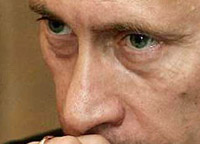Russian President Vladimir Putin’s press conference held last week was in the center of attention of the international community. This is definitely a standard and there is no need to explain why. Putin wasn’t maneuvering and answered to all questions. Then, when the conference ended, many of the president’s answers were forgotten. Yes, he did give federative Belarus an opportunity; he said that it’s not all clear and things still need to be worked out. Putin recalled that he has done judo and not aerobics, so with that said, he is not planning to run away anywhere; in other words, he will end his presidential term. Putin didn’t mention anything as to what will happen after that. That’s comprehensible; how should he know what will happen tomorrow, a couple of days later, even if he is the president?
Putin advised both Armenians and Azerbaijani to start producing Port Wine. As for the Georgians who consider the Russian Ambassador’s return to Tbilisi as a great victory, in response to one of the journalists’ opinions, he generously allowed them to continue thinking so, if that will give them the chance to improve Georgian-Russian relations. Everything is clear and simple.
However, we can’t blame the president. The answer depends on the question. Why couldn’t the Armenian journalist from Yerevan ask her question clearly and not state it in a simple and uncertain way so as the Russian President, I think, had to ask her to repeat it? But since somehow he wasn’t able to have the question repeated, the president’s answer was also rather uncertain. This not only goes for that particular question, but also the others. In particular, what kind of answer can you get after hearing the following questions?
-When (dealing with deadlines-Y.S.) will the relations between Moscow and Tbilisi be normal?
-Put yourself in the shoes of the person answering to that question-tomorrow, in a month, in a year?
-Who killed Litvinenko? What about Politkovskaya?
-The criminals.
-When will the Nagorno-Karabakh conflict be settled?-Three years, one month and 22 days after you ask the question.
-Is Sochi going to be the site for the next Olympiad?
-Most definitely, in fact, that will happen the first day the games begin.
-Will the CIS continue to exist?
-Would you want it to?
-Will there be…?
-Definitely and not one time, but always.
-What if…?
-No, nothing like that will happen, don’t worry.
-A year ago you said…but today…
-And now I’m repeating what I said last year, if you liked it so much.
Well, there you have it. You got the impression that the people asking the questions were more worried not over what they are asking, but rather having the opportunity to present themselves and ask PUTIN a question and get a response from HIM (in fact, things didn’t go as well with that either). The problem was neither the question nor the answer, but rather the process. I dare to suppose that next year, the Georgian reporter may ask: “When will Russian-Georgian relations improve?” I can’t remember how many times Putin has answered to this question during the annual press conferences-it has been asked as many times as there are press conferences. If that question is asked, then he will give the same answer: the two nations are connected to the past, religion and that unfortunately, things are so bad that we have to do everything we can to improve those relations, and so on and so forth. What if they ask him about Armenian-Russian ties? In that case, he will respond that history has shown the strength of the strategic alliance, but economic ties are not perfect and we must do everything we can to use all of our potential. If they ask about Azerbaijan, the Russian President will regret to inform that the traditional friendly ties are becoming gloomy due to insignificant disagreements and…and what? True, they must do everything to come to terms.
Now do you understand? I will repeat: the answer depends on the question.

